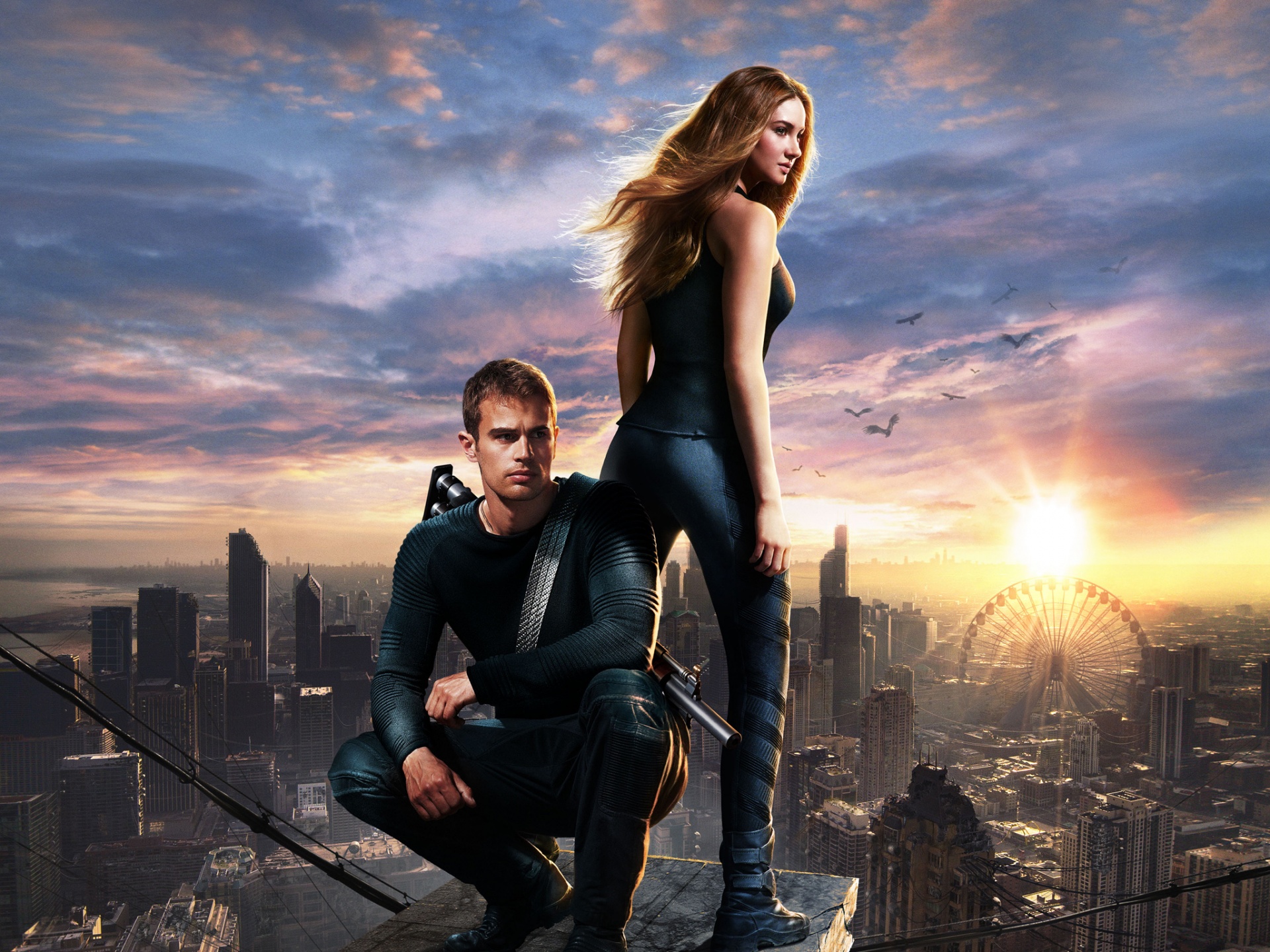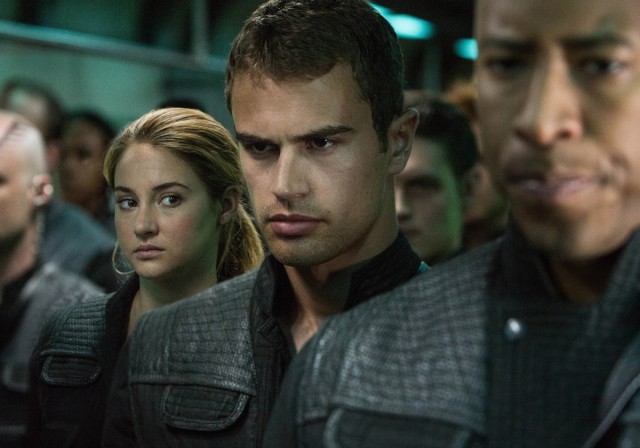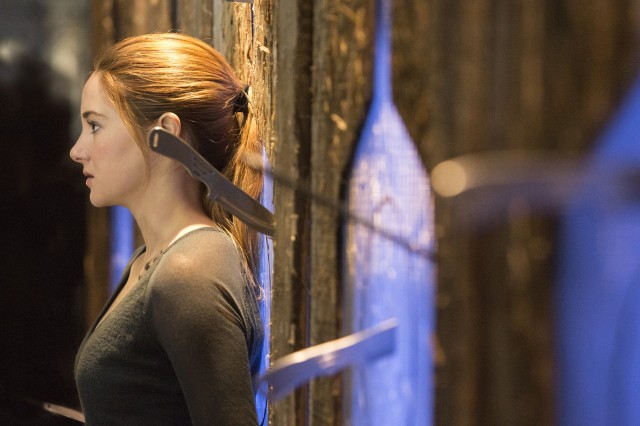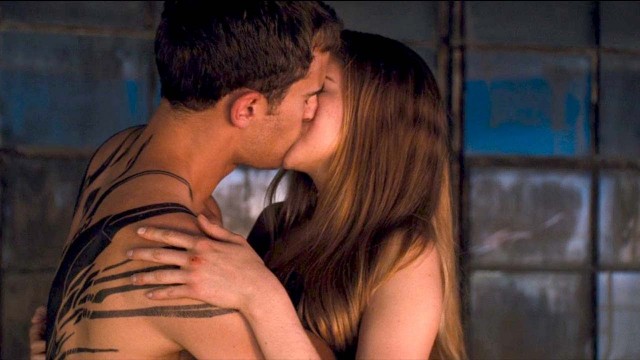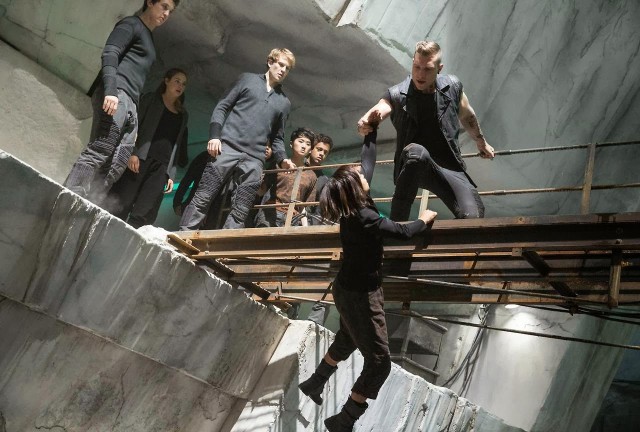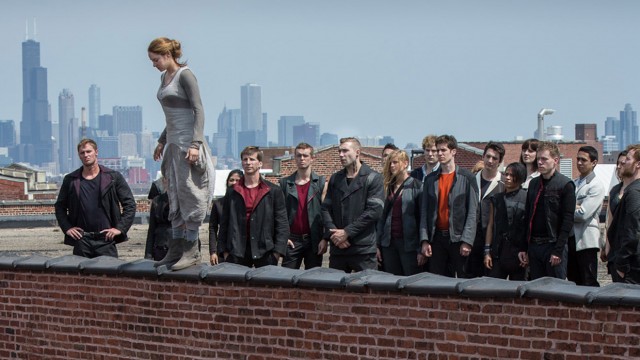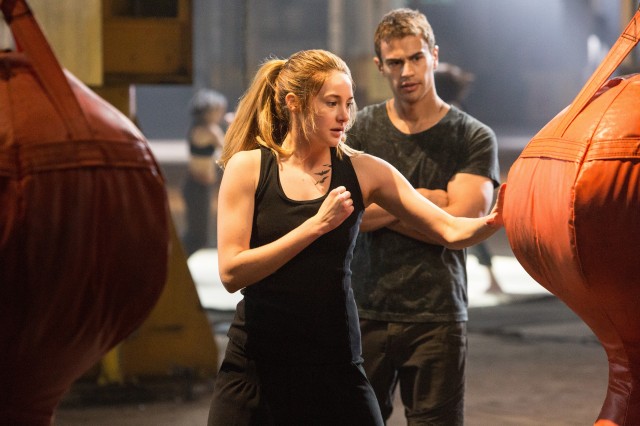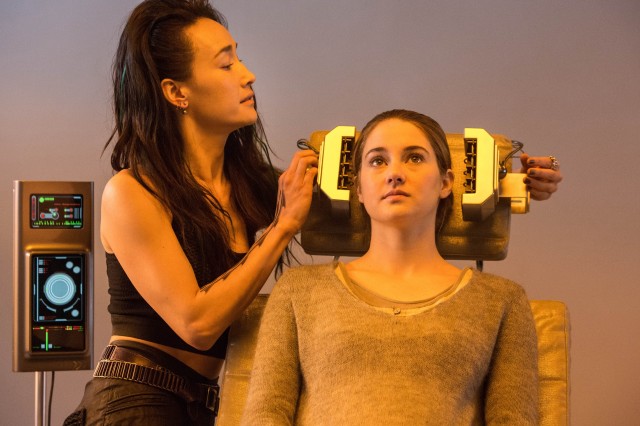Even before The Hunger Games has properly wrapped up on the big screen, we have a successor being groomed by the same studio for the young adult literature-inspired market. Said successor is Veronica Roth’s Divergent, the first in a trilogy of dystopian sci-fi novels that deal with a protagonist not fitting in quite right within a splintered set of societal factions in post-apocalyptic Chicago.
So, angsty teenagers at least should love it.
For the more discerning adult moviegoer however, whether or not you’ll like Divergent is a slightly bigger question. On the one hand, the movie doesn’t really disappoint in any real way. It’s got strong lead performances, a solid concept and a reasonably interesting world. It’s enough to justify a theatre trip for the latest YA market fad if you’re interested, basically.
On the other hand however, Divergent isn’t really groundbreaking in any real way. It’s full of elements that have been done before in even recent Hollywood blockbusters, and the very noticeable similarities to The Hunger Games, the tone, setting and some of the characters especially, make it evident that Lionsgate only optioned the movie rights because they needed another YA book craze to adapt to the big screen and keep the money rolling in. This is all the more evidenced by the fact that release dates for the two successive sequels, Insurgent and Allegiant, have already been set before Divergent was even released.
Fortunately however, Divergent is perfectly adequate for its audience. It’s not quite as good nor as smart as The Hunger Games, but it’s not at all aggressively bad and offensive like most of the Twilight series was either. It’s acceptable escapist fiction that teens and young adults will ultimately have fun with, even if the more analytical sci-fi fans out there won’t really find much worth diving into.
Divergent’s lead personality is Beatrice ‘Tris’ Prior, played by The Descendants’ Shailene Woodley. In Beatrice’s society, teenage coming-of-age rites involve picking one of five factions after taking a mental aptitude test; The agricultural Amity, for peaceful, happy individuals, the court-upholding Candor, for truthful, direct individuals, the analytical Erudite, for intelligent and ambitious individuals, the militarized Dauntless, for brave, determined individuals, and the government-serving Abnegation, for selfless and kind individuals, and the faction of the Prior family.
After Beatrice’s test results come back inconclusive, an extreme rarity, she becomes ‘Divergent’, someone who doesn’t fit into any of the five society factions, and could upset the system. With Divergents hunted for extermination by the outwardly benign Erudites, who are rumoured to be plotting an overthrow of the Abnegation faction to take over the government, Beatrice must hide her results, ultimately choosing to join the Dauntless faction, which forces her to leave her family in Abnegation.
Most of the movie chronicles Beatrice, now adopting her nickname of ‘Tris’ with her change in faction, simply trying to survive Dauntless training while keeping her Divergent status under wraps.
Once the elaborate and admittedly cool setting is established, the character work itself is not all that complicated. Only the leads, Tris and her instructor/inevitable love interest, Four (played by Underworld: Awakening’s Theo James) are given any real, interesting development. There’s attempts made to develop the supporting cast here and there, which consists of your usual supportive friends, irrational bullies, needlessly antagonistic superiors, obviously corrupt higher-up villains, and what have you. Some of these characters have decent twists thrown in later on, but oftentimes, they were realized better in the book, as some of the sudden character heel-turns in the movie feel too contrived.
Fortunately, Tris and Four are both well-acted and much better-developed, with Woodley and James also having exceptional chemistry that better makes their inevitable romantic interaction spark. Four begins the movie as a rather unlikeable bastard, and comes dangerously close to Edward Cullen territory, since it’s quite evident that he’ll eventually be a love interest for Tris, even early on. Fortunately, the character’s payoff is worth it, so by the time that inevitable affair with Tris rolls around, the character has become more agreeable and rounded, so it’s tolerable.
Tris herself is visibly tormented by her Divergent status, but for the first half of the movie, beyond the initial discovery, this is largely swept under the rug. It’s not until later on that we really see the stakes of being what Tris is, as much of Divergent is a series of training sequences that seem more focused on showing off the Dauntless initiation rites and way of life, rather than what Tris’s state of affairs means for her world at large. It’s reasonably cool and fun to see how Dauntless operate, at first, but Divergent doesn’t manage any real drama until it’s crawled to the latter half of its beefy 139-minute runtime, even with Tris apparently having to abandon her family and roots to join her new faction.
Once the stakes are properly realized however, Divergent manages a truly effective villain in Kate Winslet’s Jeanine Matthews, an Erudite leader who is responsible for hunting Divergents and plotting against the Abnegations. Jeanine’s intelligence really comes through in Winslet’s sharp performance, calculated and charismatic, but also undeniably menacing. She’s just kind of there for the movie’s first half, but when the machinations of her plot are fully realized in the movie’s second half, Jeanine becomes a worthy and imposing antagonist in her own right.
Woodley, James and later on, Winslet are the ones largely pushing the movie forward then, even with other talented actors like Ashley Judd, Ray Stevenson, Maggie Q, Miles Teller and Jai Courtney numbering among the cast. They all perform well, but, with the exception of Courtney and Teller, simply playing two smirking bullies, they’re all under-used unfortunately.
The characters and cast aren’t quite as striking or memorable as those in The Hunger Games or Harry Potter, but they get the job done, and they cement enough likeability to warrant wanting to see them again in the following two movies, if you’re a fan.
It’s easy to draw comparisons to The Hunger Games with Divergent, like I said, but to be fair, Divergent does just enough to separate itself from Suzanne Collins’ beloved trilogy of post-apocalyptic YA stories.
With that said however, while the setting is great, much of Divergent feels like it’s burdened by having to establish its world. It takes a while to get going, and while the payoff is worth it, the lengthy runtime sometimes makes the journey to the movie’s key conflict feel like a slog, especially with so much of it getting lost in simply glorifying the Dauntless faction.
At the very least, the buildup and execution of the climax feels well-done and rewarding, finally kicking up some decent action outside of training sequences with no real danger, and better demonstrating the solid stunt choreography. We also finally get a better window into how Erudite lives and operates by that point, owning the slickest and most futuristic-looking set pieces, and giving us a welcome break from the dark, grungy training environments of Dauntless.
In fact, what’s surprising about Divergent and its beefy runtime is the fact that two of the five factions are entirely ignored in the movie. Even the faction-less, who are homeless and destitute, dependent on Abnegation’s care and policed by Dauntless, are given more screentime than Amity and Candor. To be fair, Amity has a big part in the sequel, Insurgent, but in Divergent, they’re glimpsed once and are never seen again, not even really mentioned in passing.
One of Tris’s best friends is a transfer from a Candor family, but that’s about all we get of Candor in the movie as well. You get some teases in dialogue as to how the different factions perceive each other, but it’s frustratingly never properly capitalized on to develop the story. Depending on a viewer’s personal faction preference, if they have one, those who haven’t read the book may be disappointed that Divergent’s story seems to be playing favourites, not giving an even focus to the world at large, and just hanging out where it wants to.
On the one hand, this prevents Divergent’s story from becoming too unfocused, but given that its key conflict doesn’t properly show up until the second half, you’ll get a sense that there’s a big part of Divergent’s interesting setting that is just missing. Then again, this could also be the somewhat flimsy script, which sometimes wastes the setting by making it all feel too synthetic and meaningless, as if Lionsgate and Summit are just aggressively trying to reverse-engineer a Hunger Games successor without regard to how much sense it makes.
In the end, the movie has most of the pieces to make a great YA adaptation origin plot, even if some feel undeniably cobbled from other YA works, but they don’t quite come together as well as they did in The Hunger Games in particular.
Divergent is helmed by Limitless director, Neil Burger, but where Limitless was a provocatively-directed, effectively surreal piece that really showed off Burger’s skills behind the camera, Divergent feels surprisingly limp in comparison. You get the sense that Lionsgate and Summit executives were breathing down Burger’s neck throughout production, constantly urging him to just make it exactly like other successful YA adaptations.
Burger can still direct some great action, which is most evident during Divergent’s more interesting climax, but for most of the movie, he just seems disinterested. The setting may be cool in concept, but there’s no flair. Everything has a very cheap, flimsy feel, which isn’t Burger’s fault, as he’s undeniably creatively constrained here, but a fault nonetheless with Divergent as a whole. The movie is not as engaging as it should be, and had Tris signed up with any faction other than Dauntless, the movie would have been a total snore!
This is before you consider the pacing problems too. As mentioned, Divergent takes just over half its runtime to kick properly into gear, but throughout most of its duration, it feels clumsily-paced in general, as if it’s just desperately trying to follow a formula, let alone the source material. Some scenes are interesting, some are nicely emotional, but there’s never any consistency to the excitement or the character moments. Everything seems put together as the plot and the studio demands, without any regard for an actual filmmakers’ vision. It makes Divergent come off as feeling too heartless and cold.
This is where Harry Potter and The Hunger Games succeeded, and where Divergent largely stumbles. The Harry Potter and Hunger Games adaptations had worlds made with undeniable relish. They lept off the screen with a clear love of the source material and a clear appreciation of the vision on the part of the director. It’s hard to succinctly describe good directing, but you know it when you see it.
Divergent meanwhile is just kind of there. It’s sleepily-directed by a director that clearly could care less. On this note, about twenty minutes could have been shaved off the movie to improve the pacing, and cut down on desperately trying to be cool and interesting by playing up Dauntless and their work habits. Clearly, the editor could care less too.
Divergent has the typical teeny-bopper soundtrack you would expect from a movie like this. Sometimes, it even overlays certain scenes with Ellie Goulding singles, which about tells you everything you need to know about the movie’s target audience.
Like so many other things, the soundtrack isn’t outwardly bad in any way, but it doesn’t really excel in any fashion either. Even with Hans Zimmer helping to oversee it, yes, the same Hans Zimmer of The Dark Knight and Inception fame, Divergent’s soundtrack even sounds rather disinterested. and just going through the motions of what YA adaptation fans probably like.
Divergent’s effects-driven highlights come from the mental testing process both for aptitude at the start of the movie, as well as for overcoming fear and spotting Divergents during Dauntless training. The hallucination-esque sequences are the few shining moments outside of the climax where Divergent genuinely succeeds at being cool and engaging, and the only other places that Neil Burger’s direction is actually put to good use.
It’s just too bad that it’s all so frustratingly fleeting though, yanking Tris out of each sequence as abruptly as the audience themselves, right as they are likely starting to really enjoy them.
In fact, it’s even worse when the rest of Divergent feels so cheap-looking, as if corners were cut in the budget at every possible turn. Sets feel too often recycled, and everything often seems so dank and grey when it’s not just oddly-lit with mismatched hues in a desperate attempt to emulate The Capitol from The Hunger Games. The only other slightly cool-looking effects come from the semi-futuristic-looking firearms and Erudite locations that are seen later in the movie, and at least this gives the world a welcome shot in the arm towards Divergent’s conclusion.
As you can imagine however, this cheap, half-hearted presentation means that the IMAX cut of Divergent is a complete rip-off, ultimately being nothing more than a cash grab with nothing to offer for your added dollars. Just avoid it and stick with a regular digital screening, and you won’t miss anything.
Everything else however fails to evoke either post-apocalyptic or futuristic atmosphere for the most part, beyond some solid overhead shots of ruined buildings and imposing electric fences surrounding this surviving faction-based society. Divergent’s world lacks energy and reason alike, and that prevents the illusion from really taking hold too much of the time.
Divergent just reeks way too much of design-by-committee. It’s one of those movies that doesn’t feel like an actual movie, and feels more like a product. It’s clearly been executive-airbrushed and focus-tested to death, and it’s way too obvious with Lionsgate and Summit’s clear aspirations to just groom a successor to The Hunger Games, as that franchise is approaching its finale.
There’s enough to get Divergent by in the end though. The two lead actors are well-cast and work great together, some exciting moments are managed in the second half especially, and when Neil Burger is allowed to actually direct the movie as he sees fit, it does lead to some genuinely compelling and surreal dream sequences and character moments.
In the end though, Divergent is just far too middling to be noteworthy. It lacks the sense of excitement and wonder that Harry Potter did so well, and it lacks the pressing stakes and intelligent, evocative subtext that makes The Hunger Games so enjoyable. It at least avoids having the egregious stupidity of Twilight on the bright side, but it does sadly emulate that series’ cheap look and careless execution.
If you have a dystopian YA sci-fi itch to scratch as you wait for the two-part The Hunger Games: Mockingjay finale, or just enjoy the source novel and want to see the movie on that basis, Divergent is adequate. It’s nothing special, but it does enough to entertain, albeit barely.
It’s hardly required viewing though. The next Hunger Games, this is not.

